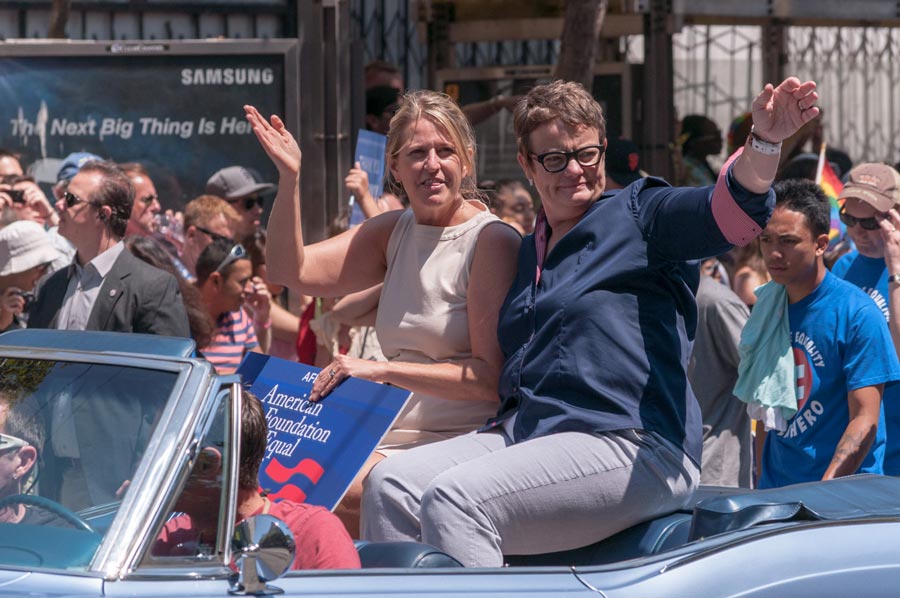
Kris Perry and Kate Stier, the plaintiffs of the Supreme Court case that legalized gay marriage in California, at the San Francisco Gay Pride Parade.
2013 saw many victories for LGBT rights, including the Supreme Court’s declaration of the Defense of Marriage Act as unconstitutional, and the legalization of gay marriage in eight new states, bringing the total to 16. In particular, gay marriage was legalized in California on June 26, 2013, following a 5-4 Supreme Court ruling that decided Proposition 8 proponents did not have the standing to appeal the district court’s decision, which ruled the proposition unconstitutional.
Section Three of the Defense of Marriage Act (DOMA), which held that marriage was only recognized as such between one man and one woman as husband and wife, was ruled unconstitutional in United States v. Windsor.
Gay Straight Alliance (GSA) president and junior Shannon Thielen remembers hearing about the news. “It was a pretty crazy week. I remember it was announced at around eight o’clock, and I was on my way to class at CSM. I was really happy, but I wasn’t really surprised. It added another great element to the Pride weekend.”
The San Francisco Pride Festival, self-described as the “largest gathering of LGBT people and allies in the nation,” was conveniently held a few days after the ruling.
Thielen, who marched with the Bay Area Youth Summit (BAYS), a youth-led LGBT organization, at Pride, says, “It was a long walk, but there was so much energy. It was really big and exciting, especially with all the announcements that came.”
However, as made evident by the shooting of two vendors at the event, not everyone was in such a celebratory mood.
“There were hate groups floating around,” recalls junior Ilana Summers, an Aragon GSA member. “It was sad that on such a fun day there would be so much crime.”
The Supreme Court’s decision has catalyzed the legalization of gay marriage in California, Delaware, Minnesota, Rhode Island, New Jersey, Hawaii, and Illinois. According to Evan Wolfson, founder and president of Freedom to Marry, 37 percent of Americans are now living in a state where gay marriage is legal.
Thielen is optimistic about the legalization of gay marriage in more states. “I think that it’s not an ‘if’; it’s a ‘when.’ Marriage equality will be … everywhere. It’s just a matter of time.” she says.
Current battleground states include New Mexico, Oregon, Michigan, Arizona, Colorado, Ohio, Nevada, Pennsylvania, and Indiana. Same-sex marriage advocates are currently gunning for referendums, and polls indicate that a majority of voters support gay marriage.
However, same-sex marriage is not completely outlawed in all of these states as it is. New Mexico neither recognizes nor bans same-sex marriage, but since a Doña Ana County clerk started independently granting marriage licenses in October, other counties have followed suit. Some, like Santa Fe County, have incurred lawsuits for refusing to do so. Moreover, some Arizonan cities, like Bisbee, are also independently issuing marriage licenses for same-sex couples.
However, others are urging a fundamentally different agenda. Advocates against same sex marriage in Indiana are pushing for a measure that bans gay marriage on the November 2014 ballot. A poll conducted by the Public Religion Research Institute in March 2013 found that 46 percent of Indianans support gay marriage, and 47 percent oppose it.
Thielen reminds others that LGBT equality entails more than just marriage. “There’s obviously been a lot of great progress, but I think that it’s really important that people remember there are other issues facing the LGBT community besides marriage equality,” says Thielen.
Some of the other issues that the LGBT community faces include transgender rights, gay adoption, and workplace discrimination.
In addition to the legalization of gay marriage, California recently made progress regarding such transgender rights. On Aug. 12, California became the first state to secure certain rights for transgender students. Gov. Jerry Brown announced that he had signed AB 1266, which protects K-12 transgender students by requiring public schools to grant students the option to use whichever locker room and restroom they wish. AB 1266 also allows transgender students to play on a sports team that suits their gender identity. The law will take effect on Jan. 1.
Summers believes that gay adoption should also be prioritized. Joint adoption, when both parents legally adopt the child, by same-sex couples is currently legal in 20 states.
Massachusetts, Colorado, Washington, and Connecticut have similar policies that grant the same protections, but California is the first state to put them into law.
Thielen concludes that though progress has been made, there is still much work to be done. “It’s important for the allies in the community to realize that the struggle is not over,” she says.




